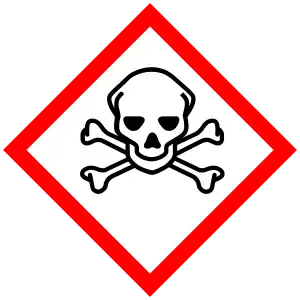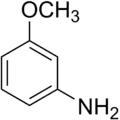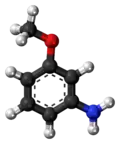m-Anisidine
m-Anisidine is an organic compound with the formula CH3OC6H4NH2. A clear light yellow or amber color liquid, commercial samples can appear brown owing to air oxidation. It is one of three isomers of the methoxy-containing aniline derivative.
| |||
| Names | |||
|---|---|---|---|
| Preferred IUPAC name
3-Methoxyaniline[1] | |||
| Other names
meta-Anisidine; 3-Anisidine | |||
| Identifiers | |||
3D model (JSmol) |
|||
| ChEMBL | |||
| ChemSpider | |||
| ECHA InfoCard | 100.007.867 | ||
| EC Number |
| ||
PubChem CID |
|||
| RTECS number |
| ||
| UNII | |||
| UN number | 2431 | ||
CompTox Dashboard (EPA) |
|||
| |||
| |||
| Properties[2] | |||
| C7H9NO | |||
| Molar mass | 123.155 g·mol−1 | ||
| Appearance | Pale yellow oily liquid | ||
| Density | 1.096 (20 °C) | ||
| Melting point | < 0 °C (32 °F; 273 K) | ||
| Boiling point | 251 °C (484 °F; 524 K) | ||
| Solubility | Soluble in ethanol, diethyl ether, acetone, benzene | ||
| -79.95·10−6 cm3/mol | |||
Refractive index (nD) |
1.5794 | ||
| Hazards | |||
| GHS labelling: | |||
   | |||
| Danger | |||
| H302, H311, H315, H319, H335, H410 | |||
| P261, P264, P270, P271, P273, P280, P301+P312, P302+P352, P304+P340, P305+P351+P338, P312, P321, P322, P330, P332+P313, P337+P313, P361, P362, P363, P391, P403+P233, P405, P501 | |||
| Flash point | > 122 °C (252 °F; 395 K) | ||
| 515 °C (959 °F; 788 K) | |||
| Related compounds | |||
Related compounds |
o-Anisidine p-Anisidine | ||
Except where otherwise noted, data are given for materials in their standard state (at 25 °C [77 °F], 100 kPa).
Infobox references | |||
References
- Nomenclature of Organic Chemistry : IUPAC Recommendations and Preferred Names 2013 (Blue Book). Cambridge: The Royal Society of Chemistry. 2014. p. 669. doi:10.1039/9781849733069-00648. ISBN 978-0-85404-182-4.
The names 'toluidine', 'anisidine', and 'phenetidine' for which o-, m-, and p- have been used to distinguish isomers, and 'xylidine' for which numerical locants, such as 2,3-, have been used, are no longer recommended, nor are the corresponding prefixes 'toluidine', 'anisidino', 'phenetidine', and 'xylidino'.
- Weast, Robert C., ed. (1981). CRC Handbook of Chemistry and Physics (62nd ed.). Boca Raton, FL: CRC Press. p. C-98. ISBN 0-8493-0462-8..
External links
This article is issued from Wikipedia. The text is licensed under Creative Commons - Attribution - Sharealike. Additional terms may apply for the media files.

